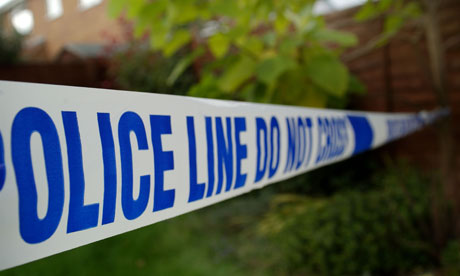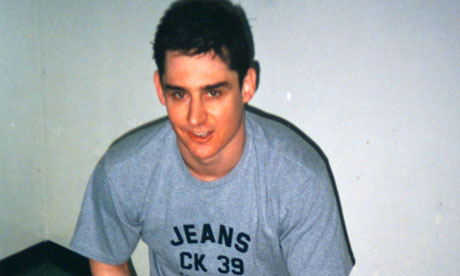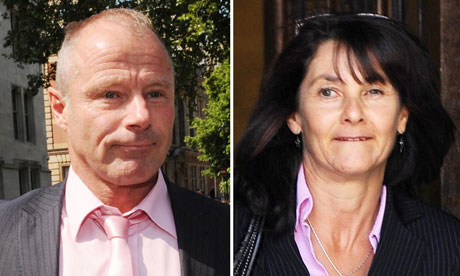Police chiefs investigated for misconduct over gangland killing case
Criminal inquiry – managed and controlled by IPCC – under way in relation to murder investigation by Staffordshire police

Four police chiefs have been placed under criminal investigation over allegations of misconduct relating to a gangland killing case. Photograph: Arthur Turner/Alamy
Four police chiefs, including the national lead on ethics in policing, have been placed under criminal investigation over allegations of misconduct, the Guardian has learned.
Formal notices of investigation were served on the senior officers, who are in positions of command at three different forces, earlier this month.
The allegations relate to a murder investigation by Staffordshire police, where all four had previously served, into a gangland killing. In 2008 five men received sentences totalling 135 years after Kevin Nunes was murdered. He was taken to a country lane where he was shot dead in a drugs feud.
The investigation into the police chiefs, managed and controlled by the Independent Police Complaints Commission (IPCC), concerns allegations that material and evidence that could have affected the trial were withheld from the prosecution and court. The official body that examines alleged miscarriages of justice is carrying out its own investigation into the case.
Nine officers have been told they are under investigation. The issuing of notices of investigation into an officer's conduct is not meant to imply any wrongdoing.
The allegations being examined by the investigation include conspiracy to pervert the course of justice and misconduct in public office.
The senior officers under investigation include Adrian Lee, chief constable of Northamptonshire, who is also the lead on ethics and policing for the Association of Chief Police Officers. Suzette Davenport, deputy chief constable of Northamptonshire, is also under investigation. The inquiry is also examining the conduct of Jane Sawyers, assistant chief constable with the Staffordshire force, and Marcus Beale, assistant chief constable with the West Midlands force.
The investigation is being carried out by the chief constable of Derbyshire, Mick Creedon, on behalf of the IPCC, which retains control and direction of the inquiry.
The men convicted of the murder have lodged a challenge to their convictions with the court of appeal, which in turn asked the Criminal Cases Review Commission to investigate issues of disclosure in the original trial. The CCRC is the body responsible for investigating alleged miscarriages of justice.
The Guardian has learned that the investigation into the officers began after material uncovered by the CCRC inquiry was referred to the IPCC, which is a police watchdog.
The four police chiefs have not been suspended from duty or arrested. It is rare, if not unprecedented, for the IPCC to investigate four officers of the most senior ranks over the same incident.
Two of the five men convicted of the murder were Adam Joof and Antonio Christie. Levi Walker was alleged by the crown to have taken Nunes, 20, to face the firing squad in 2002 and was convicted of murder, as were Owen Crooks and Michael Osbourne. Nunes, a talented footballer who had been on the books of Tottenham Hotspur, was shot five times. The convictions were gained after one man who was present, Simeon Taylor, gave evidence for the crown.
Adrian Lee became the head of the Northamptonshire force in 2009, which he joined from Staffordshire. There he was assistant chief constable, being promoted to deputy, before becoming Staffordshire's temporary chief constable.
The IPCC refused to elaborate on the detail of the investigation, but said: "We can confirm the Independent Police Complaints Commission is managing an investigation into allegations against a number of former and serving Staffordshire police officers.
"The investigation is being carried out by the chief constable of Derbyshire, Mick Creedon, under the direction and control of the IPCC. His investigation began following a request from the Criminal Cases Review Commission who are conducting an inquiry on behalf of the court of appeal in relation to an ongoing appeal. Subsequently the chief constable's investigation raised matters which were referred to the IPCC. As matters are sub judice pending the appeal case we cannot provide further information at present."
The CCRC said: "We confirm that the Criminal Cases Review Commission is investigating matters on behalf of the court of appeal in relation to an ongoing appeal involving Joof and others."
Northamptonshire police authority said: "We can confirm that allegations have been made in relation to chief constable Adrian Lee and deputy chief constable Suzette Davenport, who both served in Staffordshire police. The authority has considered information provided by the IPCC and remains completely confident in both the chief constable and deputy chief constable."
Staffordshire police authority said: "We can confirm that a serving chief officer has been served with a notice advising them that their conduct is subject to investigation. Such notices are not judgmental in any way and we need to let the ongoing investigation run its course and establish the facts.
"As a result, the police authority has taken the decision not to suspend the officer. The force and authority are continuing to fully cooperate with the IPCC and its investigation team."
West Midlands police said: "The matter has been considered by the chief constable and West Midlands police authority and the officer concerned has not been suspended. As always, West Midlands police will co-operate fully with the IPCC investigation."
Lee is the second chief constable currently under investigation by the IPCC. In a wholly separate case, the police watchdog is examining fraud and corruption allegations against Sean Price, who heads the Cleveland force. He was arrested and bailed, and has been suspended from duty. He denies any wrongdoing.
The notices issued to the police chiefs, known as regulation 14 notices, inform them that their conduct is under investigation.





